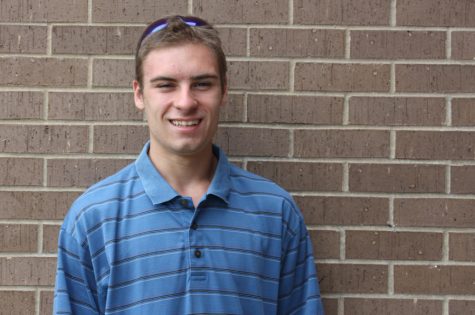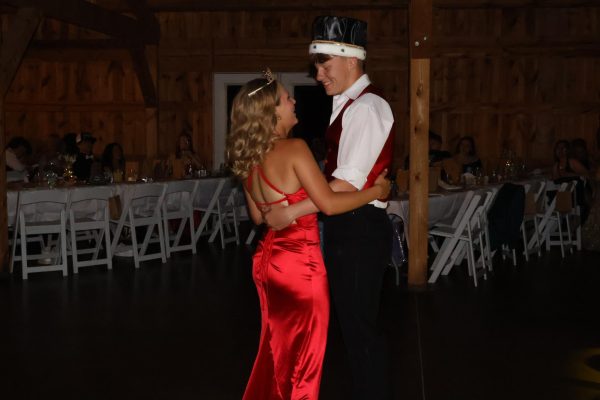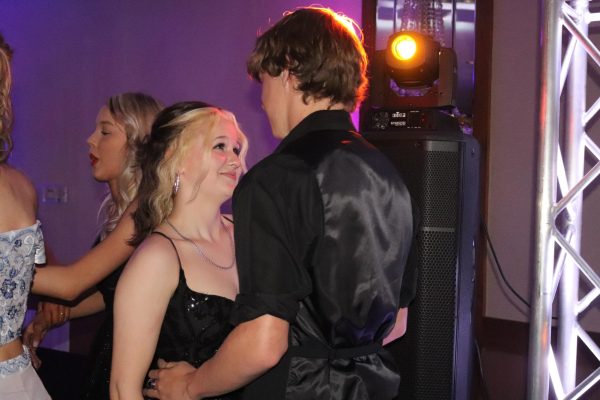Parent-teacher conference attendance drops off in high school
Fall parent-teacher conferences have come and gone, but many teachers are still struggling to meet with parents to discuss their child’s class performance.
Attendance at the Oct. 26 parent/teacher conferences was very low.
“I would hate to estimate without looking at it, I don’t know the exact percentage, but is was very low,” Principal Randy Luebbert said.
Luebbert said teachers more often see the parents of students who are doing well.
“I think, as I went around to the teachers, they really felt like that the parents showed up. A lot of time, those parents who have students who make straight A’s, we usually see most of. It is kind of a correlation, if my kid is doing well, it is because I am involved in his life. One ones who have four to five F’s we don’t see their parents and those are the parents we need to see and get them more actively involved in their kid’s lives, because that is what we want,” Lubbert said.
A new change was made this year by moving the time for conferences from 3:00 p.m – 6:30 p.m for two nights to 1:00 p.m – 7:00 p.m. on one night. Increasing the time for those parents who can’t come to the other hours that were available will help those parents have a chance to come and discuss the progress of the student. If parents can’t make it to the meetings, they are able to make an arrangement by calling the principal to set up a different time or have an email or phone conference.
“I think it helped a little bit, I don’t know if it made a significant difference as the high school. I think it really helped the elementaries ,” Luebbert said. “As a high school, our attendance was very low.”
“I hope it will allow more parents to attend, this change I hope it helps parents with scheduling meetings,” science teacher Mason Dunnaway said. |
Dunnaway said attendance for his conferences were average. He usually sees 20 to 30 parents and saw 30 at conferences this year.
“The parent teacher conference this year was good. I saw about 30 parents. The change helped, it was a way for the teacher to just focus on that one day and have everything ready for the parents,” Dunnaway said. Teachers are encouraged to contact parents outside of the regularly-scheduled conferences.
Parent-teacher contact is also changing with technology. Parents can check the Student Information System (SIS) to keep up with their child’s grades and email teachers when the need arises. Research shows that parents and teachers are an important part of each student’s life.
According to a PBS.org article “The Parent-Teacher Partnership,” “a positive parent-teacher relationship contributes to your child’s school success.”
The teachers are concerned about the parents coming to school because it seem there is a smaller amount of parents coming to the conference. The old times where the teacher and parent would talk face to face, those moments are slowly decreasing. The electronic world has changed the way people live. In today’s time some parents meet with teachers through email, phone calls, and possibly Skype.
“I usually only get a small portion of parents to attend parent teacher conferences. However, with technology today it is much easier to stay in contact and communicate with parents, ” math teacher Jowell Roellig said.
Tyler SIS, an online system where the parents can search their student’s grades at any time, may be one of the causes of fewer parents coming to the event because they already know that is the grades of their student.
“I like SIS program and so do my parents, it helps me see what I do and do not have tuned in,” sophomore Chase Steiner said.
The are many parents work twelve or more job hours making it impossible to attend events programs and difficult to appear at daytimes meeting. Also parents work may work the same hours but at a different shift (Morning-time or afternoon-time shifts). Therefore, parents, especially who have afternoon shifts, can’t make it to the meeting because it is the same time as school gets out.
“They just don’t have time anymore. Dad works, Mom takes care of the house, dogs, and babysits which is hard to come that night,” junior Alexander Thomson said.
Parents tend to come to meetings more at the elementary school, but the problem is that teachers have seen that the older the student is, the less likely that they see the parents.
Luebbert said the elementary conferencing process is a little different with scheduled conference.
“One teacher has 25 or 26 kids, so they scheduled 26 kids,” he said. “At the high school some of our teachers have 150 kids during the day, so it’s impossible for us to schedule 150; we’ll be doing it for a full month, so my expectations is they (teachers) are in contact with those parents anytime a kid is failing a class, or things like that. That is what I told the teachers. They need to call home, so that twice a year is not the only time they hear from you, especially when the student is not doing well.”
Luebbert said email and phone calls are both important parts of parent-teacher communication, but it depends on the situation.
“The kids are so much younger, so the parents feel the need to be more involved in what’s going on, I think,” she says. according to Alexandra Pannoni, Digital Producer of US and world Report news website.
Teachers still see the importance of these face-to-face conferences.
“I believe that the parent/teacher conference is important because such meetings allow parents and students to discuss their child(ren)’s progress so far in the school year. The meeting also can act as a way for parents to discuss with their child(ren)’s teacher any questions, comments, or concerns they might have for their child(ren)’s class thus far,” world history teacher Nathan Copling said.
“I think it is difficult to say whether or not there will be an increase or decrease in parental attendance at the conferences due to a myriad of factors, most likely being unavailable due to employment attendance requirements,” Copling said.

Senior PetralieJo Wurtz has not just an interesting name, but an interesting life story. Adopted when he was two years old, Wurtz left his orphanage...




